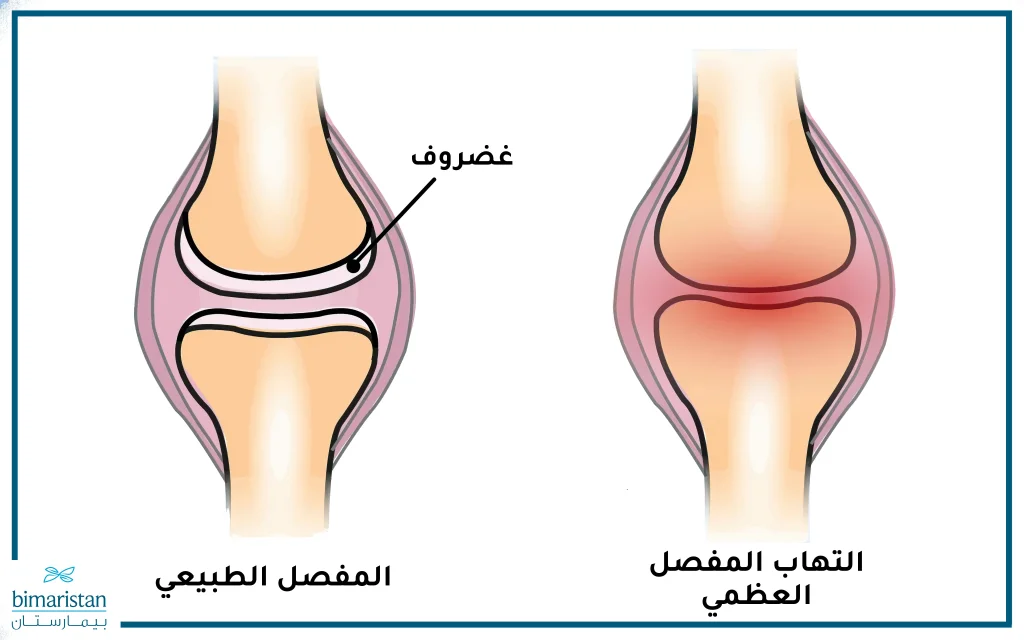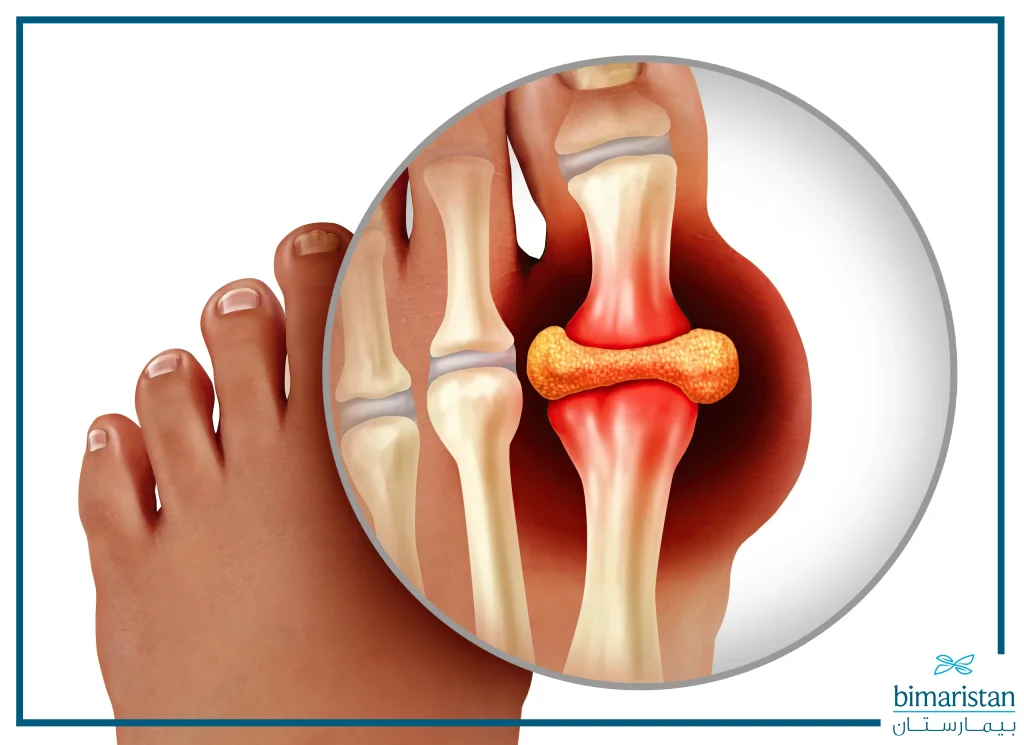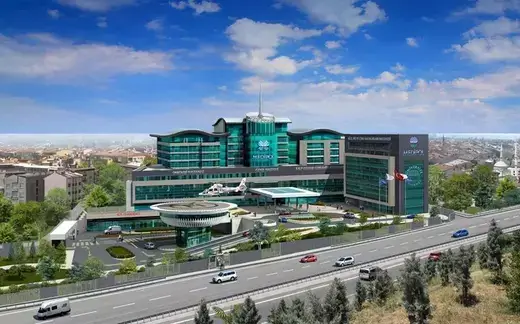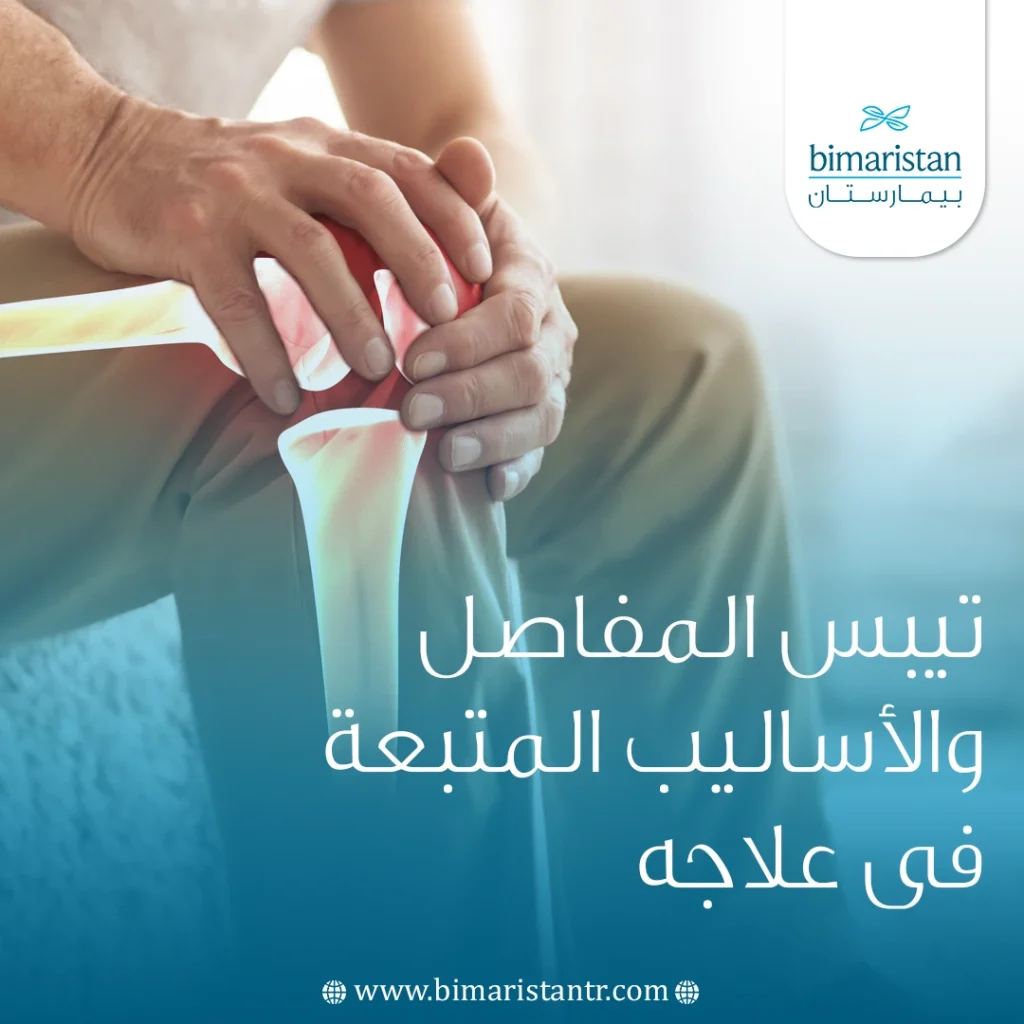تيبس المفاصل أو تصلب المفاصل هو المرض الأكثر قلقاً لفئة المسنين، لا يحدث هذا الضرر فجأة بل هو مرض يتطور مع تقدم العمر فكيف يحدث وما أعراضه وكيف يمكن علاجه؟
يحدث التيبس في المفصل نتيجة الحركة طويلة الأمد ونتيجة استخدام الجهاز الدعامي الحركي من مفاصل وعظام وعضلات مع مرور السنوات. ما هو تصلب المفاصل؟ وكيف يمكن علاج تيبس المفاصل stiff joints treatment وفق أسباب حدوثه؟
ماذا عن تيبس المفاصل؟
مع التقدم بالعمر تبدأ أعراض تخرب المفصل بالظهور، أي يحدث خلل في وظيفة المفصل ينتج عنه إعاقة في أداء الحركات. معظم المصابين بالمرض تبدأ معاناتهم في ساعات الصباح الباكر، يعد النوم والاستلقاء لفترة مديدة أهم أسباب تيبس المفاصل عند الاستيقاظ وصعوبة تحريكها.
أنواع تيبس المفاصل
ينبغي معرفة درجة صلابة المفصل لمعرفة الطريقة المتبعة لعلاج تيبس المفاصل، تتراوح درجة التيبس بين:
تيبس المفاصل الخفيف
في بادئ الأمر يمكن لليبوسة المفصلية أن تكون خفيفة عندها تحد الحركة لفترة وجيزة في ساعات الصباح الأولى، أو بعد التحرك من وضعية الجلوس لوقت طويل، لكن من الواجب ذكره أن طول مدة الاستلقاء لها دور سلبي وتتناسب طرداً مع أعراض التيبس المفصلي لدى الشخص المريض.
تيبس المفاصل الشديد
تحدث الحالات الشديدة من يبوسة المفاصل عندما يكون السبب وجود التهاب في المفصل، عندها تترافق اليبوسة مع أعراض أخرى مثل الشعور بالألم مما يجعل المشي والوقوف أمراً صعباً يصاحبه شعور مزعج بالألم، الذي يزيد شدة عندما يكون الشخص ذو وزن مرتفع، إذ تؤثر الأوزان الزائدة سلباً في حركة المفاصل عامةً.
لماذا يحدث تيبس المفاصل؟
لا بد من معرفة السبب الحقيقي وراء ظهور أعراض اليبوسة المفصلية نظراً لكون معرفة السبب نصف العلاج، في الحقيقة ليست كل حالات اليبوسة المفصلية تنتج عن التقدم بالعمر وتخرب المفصل، بل هناك أسباب عديدة أخرى، مثل: التهابات المفاصل بأنواعها:
- التهاب المفاصل الرثوي
- داء بيخترف (التهاب المفاصل المقسط)
- التهاب المفاصل الصدافي
- داء رايتر
- التهاب المفاصل المعوي
- التهاب المفصل الحرقفي العجزي مجهول السبب
يضاف لها التهابات المفاصل المرتبطة بالعدوى والأخماج مثل:
- التهاب المفاصل الخمجي
- التهاب المفصل الارتكاسي
يمكن أن ينجم تيبس المفاصل أيضاً عن مرض النقرس والفصال العظمي وأمراض المفاصل الأخرى. كما يمكن أن يسبب النظام الغذائي السيئ غير المدروس والوزن الزائد لمرضى البدانة حدوث أعراض التيبس المفصلي.
أعراض تيبس المفاصل
تتفاوت الأعراض المرافقة لليبوسة المفصلية وفق سبب حدوثها، فعلى سبيل المثال، يعد التهاب المفاصل الرثوي (الروماتويدي) أحد أمراض المناعة الذاتية أي أن الجهاز المناعي في جسم الإنسان يهاجم الجسم السليم نفسه، ينتج عن هذه الحالة تضرر المفاصل، ثم مع مرور الوقت تظهر أعراض مثل:
- ألم وتيبس مفصلي
- تشوه المفصل
- تآكل العظم
- تورم المفصل
علاج تيبس المفصل
تعد اليبوسة المفصلية عرضاً يمكن السيطرة عليه أحياناً، لكن العلاجات والأساليب الموجهة تجاهه لا تؤدي لعلاج المرض الأساسي إنما هي علاج تلطيفي، يهدف إلى تحسين نمط حياة المريض.
علاج تيبس المفاصل الروماتويدي
نظراً لكون هذا المرض يتبع لأمراض المناعة الذاتية فلا يوجد علاج حقيقي لأعراضه ولا يمكن استخدام علاج يقي المريض من تفاقمه، لكن يمكن استخدام علاج معدِّل لسير المرض يتضمن أدوية علاج تيبس المفاصل الروماتويدي:
- الأدوية الستيروئيدية: يبدأ العلاج بجرعات صغيرة (5-10 مغ/يوم)، يجب أن تعطى بالتآزر مع علاجات أخرى لأنها تحد من التخرب المفصلي بنسبة 50% فقط.
- مضادات الملاريا: يجب أن يخضع المريض للفحص كل 6 أشهر، تحسباً لحدوث التهاب الشبكية الصباغي.
- دي-بينسيلامين: قل استخدامه لكثرة أضراره، يؤخذ صباحاً على الريق ويقلل إعطاء فيتامين B6 من آثاره الجانبية.
- علاج تيبس المفاصل بأملاح الذهب: 25-50 مغ/أسبوع حقناً عضلياً، أو 6 مغ/يوم فموياً. يمكن أن يجرى الحقن ضمن المفصل.
- الميثوتريكسات: الدواء الأكثر شعبية، يعطى مرة واحدة أسبوعياً بمعدل (7.5-10) مغ/أسبوع. يمكن رفعها إلى 20 مغ/أسبوع، مع مراقبة لعناصر الدم، خمائر الكبد ووظائف الكلى، يُمنع استخدامه في الحمل والإرضاع ويمنع الإنجاب لدى الجنسين مدة 3 أشهر بعد إيقاف استخدامه.
- ليفلوناميد: يعمل منظماً لعمل جهاز المناعة، يعطى بجرعة 100 مغ/يوم مدة ثلاثة أيام ثم 20 مغ/أسبوع. يمنع الإنجاب لدى الجنسين مدة سنتين من إيقافه ولا يعطى في الإرضاع.
- السالازوبيرين: دواء شائع، يعطى بجرعة 500 مغ/يوم، تزداد بالتدريج حتى الجرعة العلاجية 2-3 غ/يوم. يجب مراقبة عناصر الدم ووظائف الكبد.
- المعالجات البيولوجية: تعد علاجات واعدة حديثة.
علاج تيبس المفاصل بسبب هشاشة العظم
تتسبب هشاشة العظم أو مرض ترقق العظام بحدوث التهاب المفصل التنكسي (تخرب المفصل)، يشيع بين كبار السن (فوق 50 سنة). يتآكل المفصل ويتآكل الغضروف الذي يحمي العظم في المفصل. تشيع أعراض تيبس المفاصل بهذا المرض في مناطق:
- الركبتين
- الفخذين
- الأصابع
- الرقبة
- الظهر

مع مرور الوقت يمكن أن تظهر نتوءات عظمية ويسمع صوت تكسر أثناء حركة المفاصل، ولعلاج تيبس المفاصل التنكسي ينبغي:
- اتخاذ تدابير صحية غذائية لاكتساب أكبر كمية ممكنة من الكتلة العظمية، تزداد أهميتها لدى كبار السن لإبطاء خسارتهم للعظم.
- ممارسة الرياضة فلها تأثير رائع على اكتساب الكتلة العظمية.
- غذاء غني بالكلس: للحفاظ على مستوى جيد للكلس في الدم، يجب ألا يقل وارد الكلس اليومي عن 1-1.5 غ/يوم، عندما يكون وارد الكلس غير كافٍ لا بد من إضافة مقدار 500-1000 ملغ كلس/يوم، يرافق ذلك مراقبة لكلس البول تجنباً لتشكل الحصيات الكلوية.
- فيتامين د: يمكن عند الضرورة مشاركة ما يعادل 800 وحدة دولية/يوم من فيتامين د 3.
- يمكن استخدام أدوية مضادة للترقق والعلاجات الهرمونية المعاوضة لسن اليأس كعلاج دوائي.
مسكنات ألم لعلاج تيبس المفاصل
يمكن استخدام مسكنات الألم لتخفيف أعراض تصلب المفاصل، مثل:
- الباراسيتامول
- مضادات الالتهاب غير الستيروئيدية
- الأدوية الأفيونية
في الحالات المتقدمة قد يحتاج المريض لاستبدال المفصل.
علاج تيبس المفاصل الذئبي
يعد مرض الذئبة من أمراض المناعة الذاتية المشابهة لالتهاب المفاصل الروماتويدي. ترافقه أعراض ألم، تورم ويبوسة في المفصل، إذ يعد هذا المرض من أحد أسباب تورم الركبة، أدوية علاج تيبس المفاصل الذئبي هي:
- دواء أنيفرولوماب (سافنيلو): يعد دواء أنيفرولوماب علاجاً رئيسياً لأعراض مرض الذئبة.
- دواء فوكلوسبورين (لوبكينيس): يرتبط ببروتين الكالسينورين فيساهم بتقليل الالتهاب في الكلى.
يمكن استخدام هيدروكسي كلوروكين (مضادات الملاريا) والستيروئيدات القشرية السكرية علاجاً داعماً مع نمط حياة جيد.
علاج تيبس المفاصل الناجم عن التهاب الأجربة
إن الجراب المفصلي عبارة عن تكيس صغير مملوء بالسائل، تصاب الأجربة المفصلية بالالتهاب فيحدث يبوسة مفصلية مؤلمة تشيع في مفاصل:
- المرفق
- الكتف
- الركبة
- إبهام القدم
- مفصل الكاحل
يمكن علاج تيبس المفاصل في هذه الحالة بواسطة راحة المفصل لأسابيع من خلال تقليل نشاط الجسم والحفاظ على المفصل بوضع ثابت حتى يتعافى الجراب. يمكن دعم هذا العلاج بمضادات الالتهاب غير الستيروئيدية الفموية والموضعية.
علاج تيبس المفاصل الناجم عن النقرس
تأتي هجمة مرض النقرس بصورة مفاجئة -عكس الأسباب الأخرى المؤدية لتصلب المفاصل- في هذه الحالة تكون المفاصل مؤلمة خاصةً عند الاستيقاظ من النوم. رغم أن النقرس يمكن أن يلحق الضرر بأي مفصل، إلا أن مفصل إبهام القدم غالباً أول المفاصل المتضررة.

من أدوية علاج تيبس المفاصل النقرسي:
- الكولشيسين فموياً
- مضادات الالتهاب غير الستيروئيدية
- الستيرويئدات
- مثبطات الأنترلوكين-1
إلى جانب ذلك، يجب اتباع حمية غير رافعة لحمض البول وغير مسمنة.
تيبس المفصل الناجم عن سرطان العظم
يعد سرطان العظم من الأسباب النادرة التي تؤثر في صلابة المفصل، في هذه الحالة ينبغي أن يخضع المريض إلى العلاج الشعاعي والكيماوي.
تخفيف تيبس المفاصل في المنزل
يمكن علاج تيبس المفاصل في المنزل بعدة وسائل، منها:
- وضع كمادات من الماء الساخن أو البارد؛ قد تكون درجات الحرارة العالية جيدة في علاج المفاصل المتيبسة.
- يمكن ضغط كيس بارد أو كيس ثلج على المفصل المتيبس مدة 15-20 دقيقة، وتكرر هذه العملية يومياً.
علاج طبيعي لتيبس المفاصل
يمكن اللجوء إلى:
- مكملات زيت السمك؛ إذ أثبتت تجارب حديثة فائدة هذه المكملات في تقليل الالتهاب. تتراوح الجرعة المثلى بين 250-500 مغ/يوم.
- بذور الكتان؛ إذ تحوي هذه البذور حمض ألفا لينوليك، الذي يساعد في تخفيف أعراض الالتهاب.
إن معرفة سبب التيبس المفصلي هي الوسيلة لوضع خطة علاج تيبس المفاصل stiff joints treatment أو تخفيف ألم التصلب المفصلي. لذا من المهم الوصول لتشخيص دقيق للحالة قبل البدء في علاجها.
المصادر:








